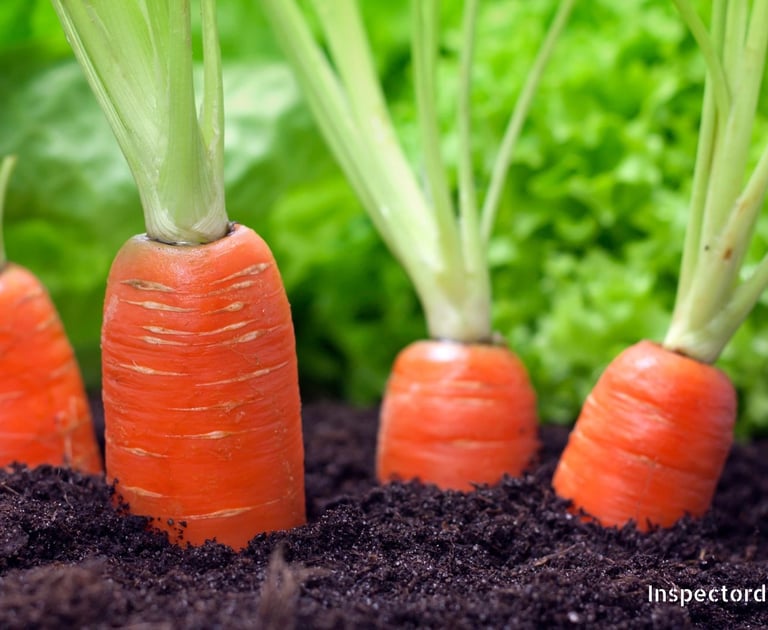
Carrot Nutrition: Eyes, Skin, and Immunity



Scientific Name: Daucus carota subsp. sativus
Family: Apiaceae
What Are Carrots?
Carrots are root vegetables celebrated for their crisp texture, natural sweetness, and vibrant orange color. They grow underground as the edible taproot of the carrot plant and are widely enjoyed raw, cooked, or juiced. Rich in beta-carotene, fiber, and antioxidants, carrots are excellent for supporting eye health, boosting immunity, and maintaining skin integrity.
Where Do They Come From?
Carrots originated in present-day Afghanistan over 1,000 years ago, where they were initially purple and yellow. The familiar orange carrot was developed in the Netherlands in the 16th century through selective breeding. Today, carrots are grown worldwide, with China being the largest producer.
How Many Varieties?
There are many carrot varieties, often grouped into types like Nantes, Danvers, Chantenay, Imperator, and Baby carrots. These vary in shape, size, and color—including orange, purple, red, white, and yellow options—each offering slightly different nutritional profiles and culinary uses.
Seasonality & Availability
Carrots are available year-round thanks to global farming practices. Their peak season typically runs from late summer through winter in temperate climates. Fresh carrots are harvested when mature but still tender, while storage carrots are kept for use throughout the year.
Benefits of Carrots
Carrots offer a wide array of health benefits:
Eye Health: Promotes healthy vision, especially night vision.
Immune Function: Supports a strong immune system.
Skin Condition: Improves skin health and appearance.
Digestion: Aids healthy digestion.
Blood Sugar Regulation: May help regulate blood sugar levels.
Antioxidant Protection: High antioxidant content protects against oxidative stress.
Gut Health: Fiber supports a healthy gut.
Heart Health: Linked to reduced cholesterol and improved heart health.
The Anti Factor
Anti-inflammatory: Contains polyacetylenes that help reduce inflammation markers.
Antioxidant: Rich in beta-carotene, Vitamin C, and falcarinol that combat free radicals.
Detoxifying: Supports liver function and natural cleansing processes.
Immune-supporting: Vitamin A and other nutrients strengthen immune defenses.
Heart-protective: Fiber and potassium help manage cholesterol and maintain healthy blood pressure.
Nutritional Breakdown (per 50g cooked)
Vitamins:
Vitamin A (from beta-carotene): 334 µg crucial for vision, skin, and immune function
Vitamin K: 7 µg promotes blood clotting and bone strength
Vitamin C: 9 mg boosts immunity and collagen production
Folate: 10 µg essential for DNA synthesis and fetal development
Vitamin B5: 0.27 mg assists hormone production and energy metabolism
Minerals:
Potassium: 169 mg regulates heart rate and muscle function
Calcium: 16 mg contributes to strong bones and teeth
Magnesium: 8 mg supports nerve and heart function
Phosphorus: 18 mg plays a role in energy storage and cell function
Iron: 0.3 mg helps carry oxygen in the blood
Manganese: 0.14 mg involved in bone development and antioxidant defense
Macronutrients:
Calories: 17 kcal low-energy food with high nutrient density
Water: 40 g supports hydration and cellular function
Protein: 0.6 g minor plant-based amino acid source
Total Fat: 0.1 g virtually fat-free
Carbohydrates: 4 g includes natural sugars and fiber
Dietary Fiber: 1.1 g promotes digestive wellness and satiety
Sugars: 2.4 g natural glucose and fructose for steady energy
What Carrots Do for Your Body
Carrots offer a unique blend of nutrients and bioactive compounds that influence multiple systems in the body. They provide slow-releasing carbohydrates, powerful antioxidants, and compounds that enhance organ function.
Eye Health: Beta-carotene converts to Vitamin A in the body, supporting night vision and retinal function.
Skin Protection: Antioxidants like lutein and beta-carotene protect skin from UV damage and aging.
Liver Function: Bioactive compounds assist detoxification pathways and improve liver enzyme activity.
Heart Health: Potassium regulates blood pressure, while soluble fiber helps reduce LDL (bad) cholesterol.
Immune Support: Vitamin A, Vitamin C, and falcarinol work together to strengthen immune responses and reduce infection risk.
Synergistic Nutrients
Carrots work best when paired with other foods that enhance nutrient absorption:
Fat sources: Olive oil, avocado, or nuts increase beta-carotene uptake.
Vitamin C-rich foods: Enhance iron absorption and boost antioxidant effects.
Leafy greens: Offer complementary minerals and phytonutrients for full-body support.
Surprising Truths About Carrots
Carrots were originally purple and yellow before orange varieties were bred in the Netherlands.
Purple carrots contain anthocyanins that support brain and cardiovascular health.
Eating too many carrots can temporarily turn your skin orange a harmless condition called carotenemia.
They contain falcarinol, a natural compound that may reduce cancer risk.
Baby carrots are not young carrots but regular carrots cut into pieces for convenience.
Environmental Impact
Carrot farming requires moderate water and land resources. Compared to animal agriculture, carrots have a low carbon footprint. Sustainable practices such as crop rotation and organic growing methods help preserve soil health and reduce pesticide runoff.
Storage & Shelf Life
Store carrots in a cool, dark place or refrigerator crisper drawer for up to two weeks.
Remove tops before storing to prevent moisture loss.
Cooked carrots last 3–5 days in an airtight container.
Freezing extends shelf life up to 10 months.
Chef or Culinary Tips
Roast carrots to bring out natural sweetness and caramelization.
Shave raw carrots into salads for crunch and nutrition.
Use grated carrots in baked goods for added moisture and fiber.
Juice them for a nutrient-dense drink or purée into soups and sauces for depth and smoothness.
Recipes or Meal Ideas
Honey-Roasted Carrots with thyme.
Carrot and Ginger Soup.
Spiced Carrot Hummus with warm pita.
Carrot Apple Salad with lemon tahini dressing.
Carrot Banana Muffins with cinnamon and oats.
The Science Behind Carrots
Carrots derive their orange color from beta-carotene, which converts to Vitamin A in the body. This pigment supports eye health and cellular protection. Falcarinol and other polyacetylenes exhibit anti-cancer properties by inhibiting abnormal cell growth. Cooking enhances mineral availability without significantly lowering antioxidant levels.
Scientific Breakthroughs As Of 2025
Enhanced Nutrients: Researchers found new ways to breed carrots with higher concentrations of anthocyanins and lycopene for enhanced cardiovascular and cognitive benefits.
Inflammatory Bowel Disease: Scientists explored how carrot-derived polyacetylenes may help regulate inflammatory bowel disease.
Sustainable Farming: Advances in sustainable farming led to improved soil health and lower water usage during cultivation.
FAQs
Can carrots improve night vision?
Yes, they provide Vitamin A, which is essential for eye health.
Do carrots raise blood sugar?
No, they have a low glycemic index and release energy slowly.
Are baby carrots real carrots?
Most are regular carrots cut into smaller pieces for convenience.
Is it better to eat carrots cooked or raw?
Both are beneficial cooking increases beta-carotene absorption, while raw preserves some enzymes.


Carrot Nutrition: Eyes, Skin, and Immunity
m
info@inspectordeepdive.com
© 2025 food.InspectorDeepDive.com. All rights reserved. Content may not be copied or republished without permission.
This article is for informational purposes only. InspectorDeepDive.com does not provide medical advice. Always consult a licensed healthcare provider before making dietary or health decisions.
